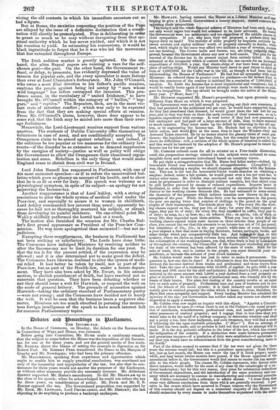Lord John Russell has reappeared in Parliament, with one of
his most animated speeches—as if to refute the unaccredited bul- letins which gave so gloomy an account of his health, and to show that he is as fit as ever for duty. His speech was welcome as a physiological symptom, in spite of its subject—an apology for not improving the Income-tax.
Another reappearance is that of Lord Ashley, with a string of resolutions to alter the whole system of medical relief under the Poor-law, and especially to secure it to women in childbirth. Lord Ashley commanded less interest than usual; apparently be- cause he had not so thoroughly mastered his subject, or shrank from developing its painful incidents. On one critical point Mr. Wakley skilfully performed the horrid task at a touch.
The motion also furnished the occasion for Mr. Charles Bul- ler's first grand appearance as President of the Poor-law Com- mission. He was more apologetics' than animated I—but not in- judicious. Excepting these reapparances, the business in Parliament has not been striking or satisfactory. The Lords have done little: The Commons have indulged Ministers by resolving neither to alter the Income-tax nor to limit its duration for one year. So that the tax is for the present settled, if the expression may be allowed ; and it is also determined not to make good the deficit. The Commons have likewise declined to alter the system of medi- cal relief. It had better be taken by itself, not as part of the Poor-law, but as part of the Health-law, under a future depart- ment. They have also been asked by Mr. Ewart, in his annual motion, to abolish punishment of death, but have resolved not to entertain that question. They have been debating whether or not they should issue a writ for Harwich, or suspend the writ on the score of general bribery. The grounds of accusation against Harwich—taking the ordinary standard of Parliamentary purity —were not strong ; and the Commons have decided not to hurry the writ. It will be seen that the business bears a negative cha- racter. Members are too much absorbed in perusing the momen- tous foreign intelligence of the epoch to have much interest left for common Parliamentary topics.


























 Previous page
Previous page